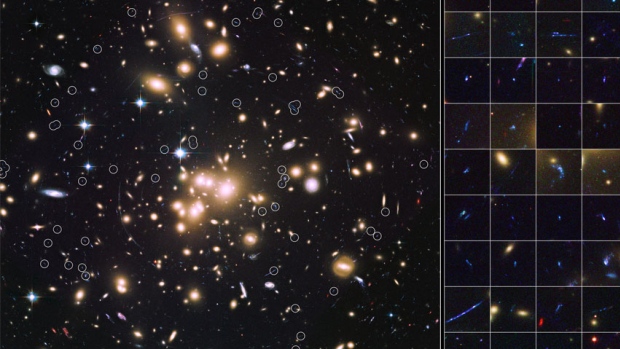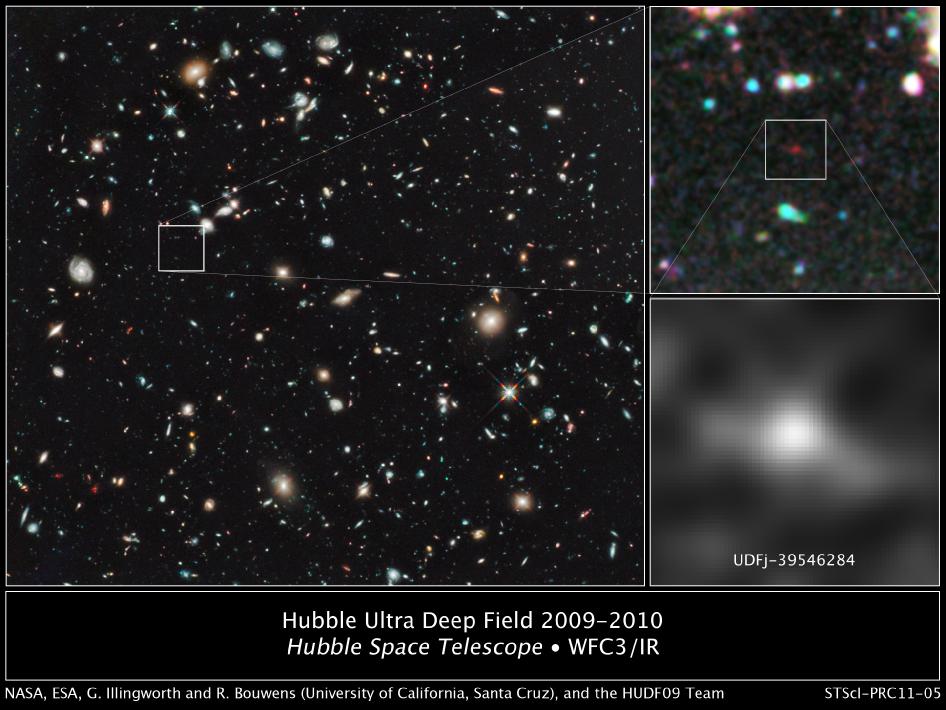There is no evidence to suggest that light speed doesn't decay over time. It's not illogical to propose that light didn't travel much faster in the past, especially with a rapidly expanding universe in which space time itself would accelerate photons.
C decay has been thoroughly debunked by true science, C&L. In fact, its dishonest methods were exposed by a creation himself.
The Crab Nebula itself is 6,500 light years away and yet the Hubble telescope has revealed galaxies 13 billion light years away.
The Hubble Space Telescope has peered back to a chaotic time 13.2 billion years ago when never-before-seen galaxies were tiny, bright blue and full of stars bursting to life all over the place.
'I like to call it cosmic dawn. It's when the lights are coming on' - Jennifer Lotz, Hubble astronomer
Thanks to some complex physics tricks, NASA's aging telescope is just starting to see the universe at its infancy in living colour and detail.
Images released by NASA on Tuesday show galaxies that are 20 times fainter than those pictured before. They are from a new campaign to have the 23-year-old Hubble gaze much earlier and farther away than it was designed to see.
"I like to call it cosmic dawn," Hubble astronomer Jennifer Lotz said at the American Astronomical Society convention in Washington. "It's when the lights are coming on."
It was a time when star formation was ramping up, and it was far more hectic than now.
'Clumpy and kind of weird'
"Imagine if you went back 500 million years after the Big Bang and looked around in the sky," astronomer Garth Illingworth of the University of California Santa Cruz said. "Galaxies are closer. They're smaller. They're bright blue and they're everywhere…They are probably blobby, small, nothing like our Milky Way."
There were probably no metals at this time, no Earths, said Illingworth, who was on the scientific team using Hubble.
"Things look clumpy and kind of weird," Lotz said.
Most of the galaxies then were close to 1,000 times smaller than our Milky Way, but astronomers said they were surprised to discover a few brighter, bigger galaxies sparkling out there.
These first pictures showed nearly 3,000 galaxies. Astronomers are still trying to figure out which of those galaxies are ancient and which are more recent.
Looking further from Earth to see the past
Because light travels nearly 9.6 trillion kilometres a year, as telescopes look farther from Earth they see earlier into the past.
While Hubble and other telescopes using different light wavelengths have seen this far back, this is the first complete set of photos in the visible light spectrum that the human eye sees.
To do this, Hubble is using one of Albert Einstein's concepts that massive clusters of galaxies have such super gravity that they magnify and stretch light, Lotz said. By focusing on clusters, astronomers use them as natural binoculars to see what's behind them.
The release of the images is significant and important, said Christopher Conselice, a professor at the University of Nottingham in England. Conselice was not part of the Hubble team.
"It'll tell us about how the universe is forming and evolving," Conselice said after the astronomers' presentation. "I think they understated it. It could be a fundamental thing."


